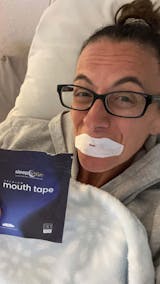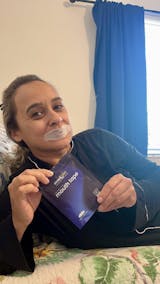Achieving restful sleep is more than a nightly challenge; it's a crucial component of your overall health and well-being. In our fast-paced, screen-dominated world, many of us find it increasingly difficult to switch off and drift into peaceful slumber. Fortunately, sleep experts have identified key strategies that can significantly improve sleep quality. This comprehensive guide explores ten in-depth bedtime rituals, including the unique practice of mouth taping, to help you achieve the deep, restorative sleep you need.
1. Establish a Consistent Sleep Schedule
One of the cornerstones of good sleep hygiene is consistency. Your body thrives on routine. By going to bed and waking up at the same time every day, you reinforce your body's natural sleep-wake cycle. This routine should be maintained even during weekends or holidays. It's not just about the quantity of sleep but the quality, and a consistent sleep schedule is pivotal in achieving this.
2. Create a Relaxing Bedtime Routine
Transitioning from the day's hustle to a state conducive to sleep requires a buffer zone. Creating a pre-sleep ritual is essential. This could include activities like listening to soft music, reading a book, practicing gentle yoga, or even a warm bath. These activities signal to your body that it's time to wind down, helping ease the transition from wakefulness to sleep.
3. Optimize Your Sleep Environment
The environment in which you sleep can have a profound impact on your ability to fall and stay asleep. Ideal sleeping conditions include a cool, dark, and quiet room. Invest in a comfortable mattress and pillows. Consider using blackout curtains, eye masks, and earplugs to block out light and noise. The goal is to make your bedroom a sanctuary for sleep.
4. Limit Exposure to Screens
In our digital age, screens are a significant part of our lives, but they are also a major disruptor of sleep. The blue light emitted by screens can inhibit the production of melatonin, the hormone that regulates sleep. Experts suggest avoiding screens for at least an hour before bedtime. If you need to use a device, consider settings or apps that minimize blue light exposure.
5. Mindful Meditation and Deep Breathing
Engaging in mindfulness practices can significantly improve your sleep quality. Meditation and deep breathing exercises help in reducing stress, calming your mind, and preparing your body for sleep. These practices are not just beneficial for sleep but also for overall mental health, helping you manage anxiety and stress more effectively.
6. Using Mouth Tape
Mouth taping is an innovative approach recommended by sleep experts for those who experience disrupted sleep due to mouth breathing or snoring. Sleepnotize Mouth Tape is a safe and comfortable solution designed to encourage nasal breathing, which is associated with deeper and more restful sleep. This method has been gaining popularity for its simplicity and effectiveness in enhancing sleep quality.
7. Avoid Heavy Meals and Caffeine
Diet plays a significant role in how well you sleep. Eating heavy or large meals late in the evening can cause discomfort and disturb your sleep. Similarly, caffeine is a known stimulant and can keep you awake if consumed late in the day. Aim to finish meals a few hours before bedtime and establish a caffeine cut-off time in the early afternoon.
8. Journaling to Clear Your Mind
A busy mind can often stand in the way of good sleep. Journaling is an excellent way to offload your thoughts and worries before bed. It's a therapeutic way to deal with anxiety, stress, or just the day's events, helping to clear your mind and prepare it for sleep.
9. Reading for Relaxation
Reading can be a soothing pre-sleep activity, especially if you choose the right type of content. Opt for light, relaxing material that helps ease your mind into a state of relaxation. Avoid emotionally charged or action-packed content that might leave you more awake.
10. Gentle Stretching Exercises
Incorporating gentle, relaxing exercises into your nighttime routine can help release physical tension and prepare your body for rest. This might include light stretching, restorative yoga, or other relaxation exercises that focus on breathing and gentle movement.
In conclusion, integrating these rituals into your nightly routine can lead to a significant improvement in your sleep quality. Good sleep hygiene isn't just a list of practices; it's a lifestyle change that can profoundly impact your health and well-being. Start with one or two changes and gradually build up to a routine that works best for you. Remember, the journey to better sleep is a personal one, and what works for one person may not work for another. Explore these tips, find your rhythm, and look forward to more restful nights and energized days.






